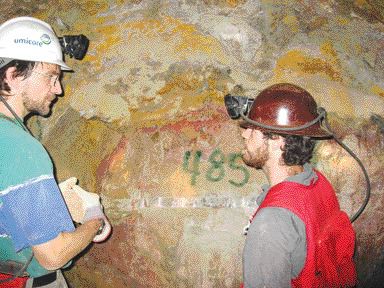Vancouver — War Eagle Mining Co.’s (WAR-V, WARGF-O) step-out drilling is boosting the size of the mineralized body at its Tres Marias zinc-germanium mine project in Chihuahua state, Mexico.
Four recent surface holes, all collared south of the shaft at the past-producing mine, returned high-grade zinc values along with significant germanium.
Hole GO-3 cut almost 5 metres (from 41.6 metres down-hole depth) averaging 21.8% zinc and 243 grams germanium per tonne, followed by a deeper 7.6-metre interval (from 79 metres) of 18.5% zinc and 119 grams germanium.
Tres Marias is a former high-grade zinc and germanium mine first put into production in the late 1940s and operated until the early 1990s. It churned out about 125,000 tonnes of high-grade oxide and sulphide zinc-lead-germanium ore with reported average historic grades of about 20% zinc and 300 grams germanium.
The company is in the midst of compiling a resource estimate based on its definition drilling and underground sampling programs. It’s aiming to delineate about 500,000 tonnes of mineralization in order to restart operations next year.
War Eagle also has a mine development application in the works to permit a 3 by 4.5-metre two-compartment shaft sunk to about 150 metres depth, below the existing seventh level of past workings. An underground rehabilitation program is under way on sections of the workings.
Mineralization at Tres Marias is associated with a low-temperature style of Mississippi Valley-type geology. Zinc, lead and germanium were deposited into Cretaceous-aged Santa Elena limestones, which included reef formations consisting of shells and seawater. Oil field brines containing sulphur, zinc, lead, iron, germanium and hydrocarbons migrated from adjacent basins and mixed with the seawater in the reef zones.
Chemical reactions in the mixing brines caused the formation of breccia bodies, collapse zones and deposition of sphalerite (also containing germanium), galena, iron sulphides and gypsum.
The collapse structures provide a readily identifiable surface expression usable as an exploration tool. Aerial examination of the Tres Marias area shows dozens of such structures, or depressions, within a 9 by 2-km zone, giving the company targets that could contain additional mineralization.
Primarily a byproduct of sulphide zinc mining, germanium is a hard greyish-white material that is a semi-conductor and has unique optical properties. Its principal use is in manufacturing fibre-optic networks and infrared night vision systems, and as a polymerization catalyst.
Demand for the element has remained strong, with sustained growth in infrared security products, silicon-germanium-based wireless telecommunications networks and in manufacturing light-emitting diodes. Germanium’s market price soared to about US$1,150 per kg recently, from around US$250 in 2003.


Be the first to comment on "War Eagle Drilling Expands Tres Marias"